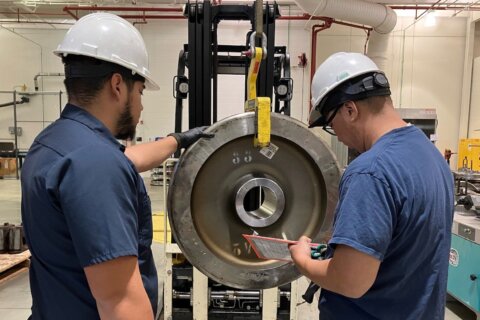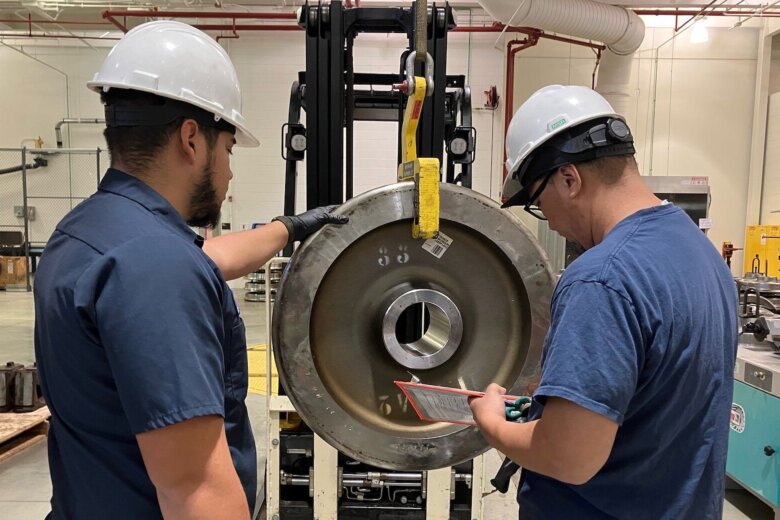
The National Transportation Safety Board released its final report on the October 2021 Blue Line train derailment, which led to more than half of Metro’s fleet of trains being pulled off the tracks and drastically reduced rail service.
The NTSB’s final report said Metro was aware of a problem that caused the wheelsets on its new 7000-series trains to drift too far apart, but that officials in the transit agency didn’t properly address the hazard before a Blue Line train derailed near the Rosslyn Metro Station.
“This incident was 100% preventable,” said NTSB Chair Jennifer Homendy during a Thursday news conference. “We’re absolutely lucky that this did not end in a tragedy.”
The report has now led to finger pointing between the D.C.-area transit agency and Kawasaki, the manufacturer of its 7000-series railcars. In the midst of a budget crisis, Metro said Thursday that Kawasaki is responsible for paying all costs to fix the issue that caused the derailment. Kawasaki responded by saying it built 7000-series cars to fit Metro’s design specifications, and that Metro mismanagement is to blame.
What happened during the October 2021 derailment
The Blue Line train that derailed was carrying 187 passengers through a tunnel south of the Rosslyn station when it went off the track. The NTSB report found the same train had previously derailed two other times earlier in the day, but rejoined the tracks at crossovers shortly after.
Nobody was hurt in the final derailment, but some passengers were trapped in a tunnel in a dark train car and had to be evacuated on foot. Metro estimated the damage to the track and equipment was nearly $700,000.
In the wake of the derailment, Metro pulled all 748 of its 7000-series rail cars — the transit system’s newest-model rail cars — from service, sidelining 60% of its total fleet.
The derailment and the ensuing investigation also helped speed the ouster of former WMATA general manager Paul Wiedefeld. After announcing his retirement date of July 2022, Wiedefeld left two months early in May 2022 amid revelations that half of WMATA’s train operators had lacked retraining and testing required for recertification. Wiedefeld now serves as Maryland’s secretary of transportation.
Report: Some in Metro knew about wheelset issue, didn’t sound alarm
The NTSB report concludes that some in Metro knew about the defect in wheelsets long before the derailment. However, according to the report, concerns about the issue never made it out of the office that discovered the problem.
“Shortcomings in WMATA’s internal communications, in its recognitions of hazards, its assessments of risks from those hazards, and its implementation of corrective actions are all evidence of an ineffective safety culture within the organization,” Homendy said.
Homendy was reading comments about Metro from 2009, saying they still apply today.
“It’s the same story again and again, since 1970,” she said.
According to NTSB’s interview with the senior program manager for the 7000-series program and Metro’s deputy chief mechanical officer, the Office of the Chief Mechanical Officer, Rail (CMOR) first noticed “wheel migration” in a 7000-series wheelset in March 2017 — more than four years before the Rosslyn derailment.
From 2017 to the date of the derailment, inspections of 7000-series cars performed at 90-day intervals turned up 31 wheelsets that had drifted too far apart.
The office didn’t know what was causing the wheel migration — but did not conduct or obtain what’s called a trend analysis to further study the matter, according to the report. Officials in the office also didn’t list the problem on a “Hot Issues” list used to prioritize certain problems that could affect service or safety.
The senior program manager said the issue of wheelset migration was “very important,” and although the mechanical office knew about it, it was not added to the “Hot Issues” list because of a “low occurrence rate and the use of inspections to mitigate safety concerns,” according to the report.
In December 2020, Metro adopted a new version of its safety plan, which required each department to share safety data with other departments. The plan highlighted “trend analysis” as part of “actively seeking to identify hazards and mitigating them effectively before adverse events occur.”
However, the NTSB did not find evidence that the office conducted a trend analysis or took other steps to address the wheel problem beyond its regular inspections. In fact, the report found, based on interviews with Metro officials, no one outside the office was aware of wheel migration in 7000-series railcars until after the derailment.
Call for action
As a result of its investigation, the NTSB recommended Metro “implement processes and resources to expand the role of trend analysis in identifying and mitigating safety risks.”
The board also recommended that Metro’s safety watchdog, the Washington Metrorail Safety Commission, develop and implement a program to support and monitor Metro’s use of such trend analysis.
WMSC said in a statement Thursday it will carefully review the NTSB’s report and take all appropriate action. WMATA also said in a statement that it “fully supports the NTSB Derailment report and thanks all parties to the investigation for their leadership and thoughtful approach.”
During Thursday’s news conference, Homendy said there also isn’t enough being done on the federal level to protect riders on public rail systems.
“If I wanted to haul a freight train full of coal through West Virginia today, there is a large book of federal standards I’d have to abide by, but if I want to operate a transit train loaded with passengers at rush hour in the nation’s capital, there are no federal minimal standards required. None,” she said.
Homendy urged the Federal Transit Administration “to take immediate action to regulate and enforce safety on our nation’s public transit rail systems.”
Who should foot the bill for wheelset issues?
Following the release of the NTSB report, Metro said in a statement that it’s issued a “fleet defect notice” to Kawasaki related to their performance-based contract.
“Based on the contract, Kawasaki is responsible to pay all costs to fix this wheelset defect,” Metro said in its statement. “We are confident that our current Wheelset Replacement program will address this wheelset defect as we work over the next several years to re-press all 7000-series wheelsets.”
However, Kawasaki flipped responsibility back on Metro, saying the NTSB’s conclusions align with its findings and confirm Kawasaki met the design and mounting specifications established by Metro.
“While we understand the budget crisis that WMATA is facing, any suggestion that Kawasaki should absorb the cost of WMATA’s own failures regarding the wheelsets of the 7000 series trains is not rooted in reality,” the railcar manufacturer said. “The mismanagement by WMATA under prior leadership, cited in the NTSB’s final report, comes as no surprise to those who have followed the agency.”
Metro said in December it faces a $750 million funding deficit for the next fiscal year, and has proposed a budget with massive cuts that include reduced service and fare increases.
The Associated Press contributed to this report.
Get breaking news and daily headlines delivered to your email inbox by signing up here.
© 2024 WTOP. All Rights Reserved. This website is not intended for users located within the European Economic Area.









